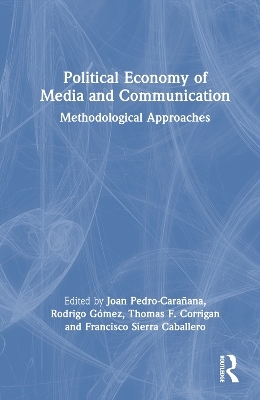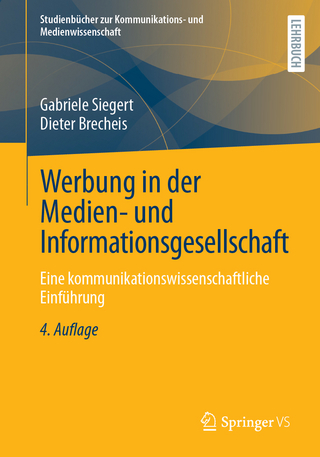
Political Economy of Media and Communication
Routledge (Verlag)
978-1-032-47307-9 (ISBN)
Featuring contributions from across the globe and a variety of methodological perspectives, this volume presents the state of the art in political economy of media and communication methods, articulating those methods with adjacent approaches, to study concentration of ownership and power, pluralism and diversity, regulation and public policies, governance, genderization, and sustainability. This collection charts the methodological innovations critical political economists are adopting to analyse a rapidly transforming digital media landscape, exploring ideology, narratives, socio-analysis and praxis in communication with ethnographic and participatory approaches, as well as designs for quantitative and qualitative methods of textual, discourse and content analysis, network analyses, which consider power relations affecting communication, including intersectional oppressions and the new developments taking place in artificial intelligence.
An essential text for advanced undergraduates, postgraduate students, and researchers in the areas of media, cultural and communication studies, particularly those studying topics such as the political economy of media and/or communication, media and communication theory, and research methods.
Joan Pedro-Carañana is a associate professor in the Department of Journalism and New Media at Universidad Complutense de Madrid, Spain. Rodrigo Gómez is a professor in the Department of Communication at Universidad Autónoma Metropolitana-Cuajimalpa, Mexico and and a Maria Zambrano Fellow at Universidad Carlos III de Madrid, Spain. Thomas F. Corrigan is a professor in the Department of Communication Studies at California State University, San Bernardino, USA. Francisco Sierra Caballero is a senior researcher and professor of communication theory in the Department of Journalism at the University of Seville, Spain.
Foreword Janet Wasko Introduction Thomas F. Corrigan and Francisco Sierra Caballero, Rodrigo Gómez,and Joan Pedro-Carañana Part I: EPISTEMOLOGY OF THE POLITICAL ECONOMY OF MEDIA AND COMMUNICATION Introduction Thomas F. Corrigan 1. Rethinking “method” in the political economy of media and communication: A realist perspective Thomas F. Corrigan 2. A historical-structural approach to media research Enrique E. Sánchez-Ruiz 3. Internet policy research: Critical epistemological and methodological considerations Robin Mansell 4. Who knows? Feminist epistemologies, gendered labor, and a political economy of communication Micky Lee Part II: INSTITUTIONAL AND STRUCTURAL ANALYSIS Introduction Rodrigo Gómez 5. With history at its core: Making a case for historical methods in critical political economy Mandy Tröger 6. Political Economy of Communication and Network Analysis Rodrigo Gómez and Ben Birkinbine 7. Audiovisual diversity and subscription video-on-demand services: Mapping the territory in Spain Josep Pedro and Luis A. Albornoz 8. Measuring media pluralism in informative TV programs through a multidimensional multi-scope instrument Chiara Sáez Baeza 9. The framework of analysis as integrative scaffolding for our research Argelia Muñoz Larroa 10. Political economy and critical studies of advertising and media industries Jonathan Hardy Part III: ANALYSIS OF IDEOLOGY, SOCIO-ANALYSIS AND PRAXIS Introduction Joan Pedro-Carañana 11. Quantitative and qualitative content analysis in political economy research: A systematic review of strategies, methods, and techniques Florian Zollmann 12. Elite news content (still) matters now more than ever before: Social movements, social media, elite news media, and the media dependence model Andrew Kennis 13. The dialectical model of social mediation and its methods for researching the social production of communication Joan Pedro-Carañana 14. Structure meets agency: Political economy and ethnography Olga Lucía Sorzano and Toby Miller 15. Participatory action research in political economy: Researchers’ commitment to communication democratization and social justice Adilson Vaz Cabral Filho 16. A methodological proposal for the analysis of the Political Economy of Communication from an intersectional feminist perspective M. Cruz Tornay-Márquez Part IV: ARTIFICIAL INTELLIGENCE AND EMERGING CHALLENGES Introduction Joan Pedro-Carañana 17. Artificial intelligence and technological accelerationism: A critique of cybernetic ideology Francisco Sierra and Daniela Inés Monje
| Erscheinungsdatum | 03.02.2024 |
|---|---|
| Zusatzinfo | 31 Tables, black and white; 8 Line drawings, black and white; 8 Illustrations, black and white |
| Verlagsort | London |
| Sprache | englisch |
| Maße | 152 x 229 mm |
| Gewicht | 453 g |
| Themenwelt | Geisteswissenschaften ► Geschichte |
| Sozialwissenschaften ► Kommunikation / Medien ► Kommunikationswissenschaft | |
| Sozialwissenschaften ► Kommunikation / Medien ► Medienwissenschaft | |
| Sozialwissenschaften ► Politik / Verwaltung | |
| ISBN-10 | 1-032-47307-X / 103247307X |
| ISBN-13 | 978-1-032-47307-9 / 9781032473079 |
| Zustand | Neuware |
| Informationen gemäß Produktsicherheitsverordnung (GPSR) | |
| Haben Sie eine Frage zum Produkt? |
aus dem Bereich


